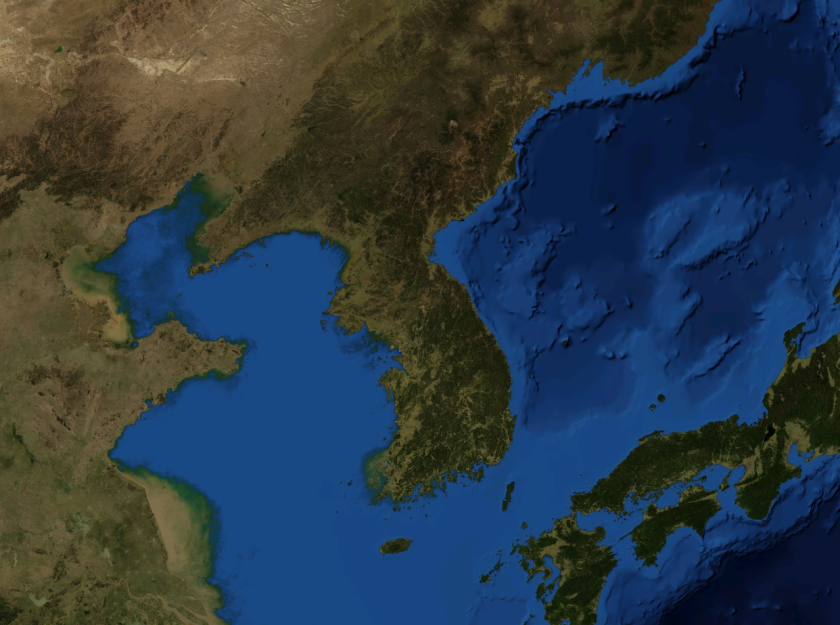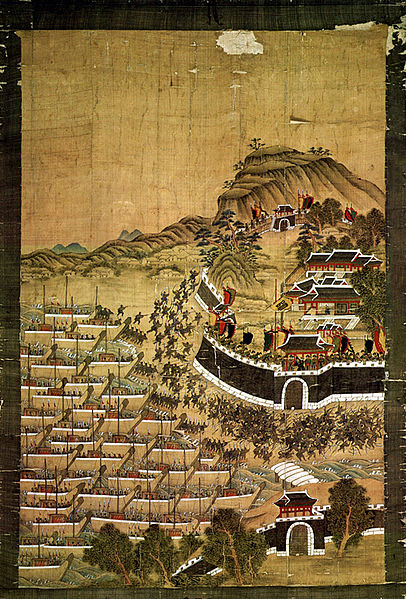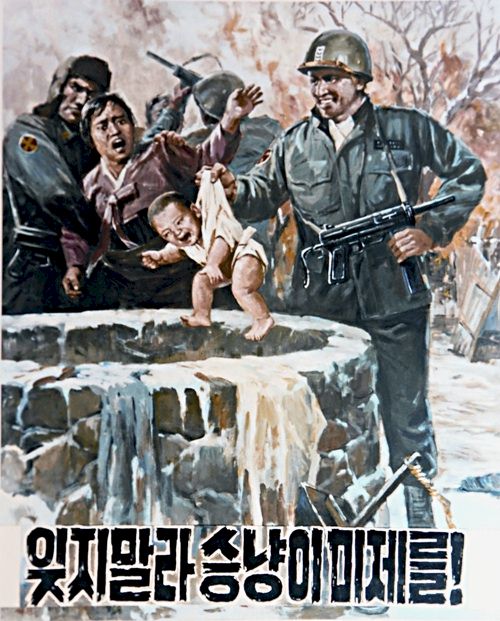North Korea’s third nuclear test has provoked the expected condemnation from the international community. With sanctions against Kim Jong-Un’s state already pretty severe, the usual dilemma of what punishment to impose on the North Koreans without resorting to military might is confounding leading statesmen.
As mentioned before on this blog, there is likely to follow a period of diplomatic brinksmanship before the North Koreans extract an alleviation of certain sanctions in exchange for a promise to dismantle its nuclear programme. Talks and posturing will rumble on, maybe even with the return of the Six-Party Talks, before the next nuclear test is undertaken and the process is repeated.
North Korea’s leader has cause to feel vulnerable. His state is isolated, shorn of allies, internationally castigated. Yet it also suffers from a historical vulnerability that has always plagued the Korean Peninsula.
Strategically located between China, Japan and Russia, Korea has historically been highly sought after. With excellent sea access, and the resulting trading benefits that brings, in addition to particularly fertile farmland, it has been desired and conquered by countless foreign warriors.

As early as the second century BC, Korea was invaded by the Han Dynasty of China, which established a series of vassal kingdoms across the peninsula. In the thirteenth century, the Mongols invaded, forcing the Goryeo Dynasty into a defensive treaty to maintain a degree of independence. Even the long-lasting Joseon Dynasty (1392-1910) suffered frequent invasions from Manchuria and, in the sixteenth century, Japan, each time surviving in a weakened condition.

By the late 19th century, the economic and industrially-stagnating Korean Peninsula became the target of China, Russia and, once again, Japan. The imperial might of the Japanese won out and by 1910 Korea was under foreign occupation, a pitiful state which would remain until 1945 and the Japanese defeat in WWII.
After WWII, with the great powers once again manoeuvring for influence in the Far East as part of a new Cold War, Korea became a battleground once again. Between 1950 and 1953, the Soviet-backed North, with help from China, fought the American-backed South into a bloody stalemate. The separate paths of the two Koreas since then is well documented.
Given such a history, in which Korea has been lusted after and fought over by regional and world powers alike, often to the detriment of the local populace, you could forgive its leaders for being hesitant in their foreign policy. Of course, the South Koreans sought to banish their sense of vulnerability through economic development, capitalist expansion and rising living standards. South Korea’s position as the world’s 15th largest economy is testament to the success of its developmental path.
The North Koreans, on the other hand, have adopted a fierce nationalism in which the country’s status as an international pariah, condemned by history, is frequently used to justify the militaristic trumpeting, nuclear threats and vicious propaganda that has come to symbolise the country. Such methods, North Korea’s leaders argue, are a necessity in the face of a world historically hostile to its people.

Whether the development of a miniaturised nuclear warhead to fit onto an intercontinental ballistic missile will satisfy the North Koreans that their country is at last safe from foreign “imperialism”, it is hard to say. What is obvious, however, is that its Kim Jong-Un and his people who will decide the future of North Korea; not the foreign powers that have historically done so.

I went to a model united nation where my agenda was north korea, i was in the SC and really regret that why had you not written that post at that time.
also would you please read my posts thanx
I am also (currently) doing Model United Nations, except I’m in GA. I am Morocco a semi passive country and this article REALLY helped. thnx!
History does repeats itself. Human kind don’t learn the hard lessons.Regards.jalal
Great post right there! I liked it. If you ever want to know about Ocean Sports and Turism visit our site http://www.surfskiesp.com
Regards!
Carlos
I would love to read more about how the divide between North and South Korea came about. I would also be interested in how the North became so isolated. But this is still great information, thank you.
I highly recommend the book “Nothing to Envy: Ordinary Lives of North Koreans.” It gives great insight into the insular nation, its history, and its relationship with South Korea.
Congrats on being Freshly Pressed!
We’re studying Korea in class, so this article was really helpful (and well written). Being as devoid of allies as North Korea is right now (even China condemned the test, if my sources are correct, and that’s North Korea’s biggest ally) what is our next step? And even if we do go to war what would prevent it from becoming a MADs-esque situation?
This is a great article, I really enjoyed reading it! I think you make a great point. Considering the history of North Korea and Korea as a whole which has been subject to numerous invasions, the extreme nationalist stance the North Korean regime has taken since the Korean war is hardly surprising. It now feels the need to reassert its authority after long periods of vulnerability. Its recent nuclear test is clear evidence of this.
Very informative read.. I may just need to visit the DPRK later this year.
It sometimes amazes me how such small and isolated countries can survive, even when surrounded by hostile neighbors. However, in this modern world where one weapon, a nuclear bomb, can eliminate so many people, I guess size has ceased to matter.
Anywho, great post!
Sincerely,
Julien Haller
Reblogged this on nealstotts.
Reblogged this on Eyagee's Blog and commented:
For those today would like a Readers Digest Condensed version of Korea’s history, this does a pretty good job.
Great post. i personally feel that they will start to get angry, people are extremely good at getting pissed off, all that needs to happen is for their loved ones to start dieing and the only place that they can point the finger is at the powers set above them. This will happen in time. History will come back to bite them on the ass.
as the world gets smaller I guess we will never learn “one planet, one people ”
As they say history repeats itself, and we never seem to learn from past mistakes !
Great post.. i totally disagree with North Korea’s nuclear test..
I wish we didn’t have to worry about things like this and there would be peace. Not in our lifetime, right?
“The North Koreans, on the other hand, have adopted a fierce nationalism in which the country’s status as an international pariah, condemned by history, is frequently used to justify the militaristic trumpeting, nuclear threats and vicious propaganda that has come to symbolise the country.”
Anyone interested in “how North Koreans see themselves” should try The Cleanest Race by B.R. Myers.
Also, I find some of the comments in this section a bit too simplistic. I don’t want to take this too political, but I want to say some things. For instance, buyadsenseaccount’s disagreement with North Korea’s nuclear test… Of course you disagree. Idealistically, anyway. Nobody wants a world of nuclear weapons. But to look at it from the DPRK’s point of view, and it becomes more complicated than that. Also, what gives some states legitimacy towards owning and testing nuclear weapons and not others?
And segmation: “peace” is way too idealistic and likely impossible to achieve. Nobody wants to worry about such things like nuclear destruction. Talk like that seems shallow to me. Of course, in a very macabre twist, nuclear annihilation and the extinction of the human species would ensure your “peace”, wouldn’t it? 🙂
thank you for this post
This was an interesting post. Not extremely detailed, but interesting nevertheless. 🙂
I met the news of North Korea’s latest tests with dismay. Insofar as they can be ‘about’ anything, nuclear weapons are about bargaining rights and leverage (do ‘x’ or we’ll fire). As a weapon of war they are almost entirely useless (if only because the USA and Russia have so many more and they’re so much more sophisticated, read: ‘destructive’). Even tinpot regimes aren’t so suicidal.
But most people are in agreement that nuclear weapons are bad things, even if they’re for the purposes of brinksmanship negotiations or self-aggrandising.
I always wonder with these situations whether the west ought to take the opposite tactic – instead of imposing economic sanctions and threatening war maybe we should air drop medical supplies, consumer goods, food, clothes etc marked ‘from USA with love’. Reason being this sort of regime maintains power as much by propagandising ‘the enemy’ (USA) as imperialist demons. take that away and maybe it’ll work better.
Who knows, all I know is that Einstein had a name for repeating the same action and hoping for a different response: insanity. Sanctions don’t tend to lead to autocrats saying ‘you know what, you’re right, I’ll stop, my bad.’
Nice piece on a difficult topic.
“What is obvious, however, is that its Kim Jong-Un and his people who will decide the future of North Korea; not the foreign powers that have historically done so.”
I am not sure what you mean in this statement, but in any case I don’t think anything dealing with the future of North Korea is obvious. I could imagine that sanctions on North Korea could lead to even greater rates of starvation. Globalization has even been able to infiltrate North Korea thanks to brave Koreans who risk their lives to cross the border. Copies of South Korean dramas have been passed along. These shows bring to light another world outside of what they had known to exist. Books are being smuggled and read and passed along and slowly people are realizing that the world they know has been nothing but a fabrication. When they feel they have nothing else to lose I think there is a possibility of an uprising. A few years ago many people might have easily brushed the idea off as impossible but with the recent uprisings in Northern Africa and the Middle East, it shouldn’t be ruled out.
Regardless of whether globalisation is finally beginning to impinge on North Korea, and its affect is still very limited, the future course of the country will depend on the inclinations and ambitions of Kim Jong-Un and the power-brokers behind his throne.
Starvation levels are unprecedented and, naturally, further sanctions will exacerbate the situation. But, even should the unimaginable popular uprising occur, a standing army of over million soldiers would easily quash it. Such is the reason for channelling all wealth and food to the Korean People’s Army.
Change in North Korea can only come from the top. International responses to North Korea’s continuing belligerence are necessarily reactive. It is impossible, of course, to set a consistent policy for North Korea. Such unpredictability and the failure to conform to the typical behaviour of modern states negates the foreign intervention that has typified Korea’s history.
The possibility of a regime change cannot be ruled out. But it will come from machinations and power struggles within the ruling elite not from the North Korean masses or foreign powers.*
* The only exception to this, I would conceded, would be if China and Iran were to withdraw all support from North Korea. This is very unlikely to happen in the near future.
Reblogged this on gilmo74's Blog.
Excellent! Thank you
Great post. However, I can’t help but view North Korea metaphorically as the world’s immature cousin that everyone dread’s seeing at the family reunion. I fear they will scream and shout and fight until they get the respect and credibility they think they deserve instead of changing to earn it.
Reblogged this on Oyia Brown.